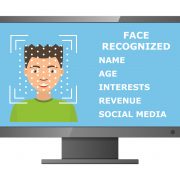We live in a world where our personal data is collected by both governments and private companies alike. Since most of our lives are now conducted online, every time we shop for something, communicate with someone or search Google, we are making ourselves vulnerable to data mining. And with data collection, comes the fear over the security of that information.
And while this data gathering has benefited the consumer by offering individualized suggestions for future purchases, it still puts them at risk. All this information has to be stored somewhere, and this means physical hard drives and servers, each susceptible to hackers. And though this personal data collection is of huge concern, it isn’t nearly as concerning as the government’s store of personal data.
In the post-9/11 world, our bank records, travel records, and phone records are all being collected by the government under the guise of national security. Of course, none of this is news in 2018, but it wasn’t so long ago when this concept of mass data collection seemed positively Orwellian. But in 2013, the magnitude of massive state surveillance and data collection became known to the American people through the Edward Snowden leaks.
Not only was the government spying and collecting our own personal data, it was also storing this personal information. This also means that every single person whose information was stored, which is virtually everyone, is vulnerable to having their information accessed and stolen by hackers. The government having access to it is bad enough.
But blockchain technology has presented new avenues for data security that could protect data from all prying eyes, whether government or otherwise.
Enter Blockchain
To call the blockchain anything less than revolutionary would be an understatement. Not only is this technology striking a blow to traditional financial and banking institutions with various cryptocurrencies, it is also allowing individuals to make private transactions, free from government intrusion. And that is where data collection comes in.
By utilizing the blockchain as a means of storing personal data, you keep it safe. But there is more to it than that. Just as cryptocurrencies can be sent and received on the blockchain, so can data. And since this is both anonymous and secure, you do not run the risk of having this information intercepted, and then stored, by either private companies or governments.
Explaining how this works, Forbes writes:
“Imagine you and a million friends are able to make copies of all your files, encrypt them with special software, and save them in each other’s digital bank vaults (computers) all across the internet. That way even if a hacker breaks into, steals, or destroys your computer, they can’t interpret your data, and your network of friends still have 999,999 backups of your files.”
No one can read your data unless you give them access to it. Even if there is a breach, the personal information is safe behind its layers of encryption. And this can be used to store and transfer all kinds of information. For example, many in the medical field are intrigued by the prospect of potentially storing medical records on the blockchain.
The health care industry is so diverse and vast, it becomes difficult to keep track of patients who move or switch health care providers. But by utilizing the blockchain, records can be kept track of and stored on the blockchain. This also means that transferring these records is more secure than it is today. Currently, obtaining or sending medical records usually means having to track down a fax machine and then send extremely personal information, not entirely sure who will be waiting on the other end of the transaction.
Blockchain is bringing us into a new era, where personal data is more protected than ever before.












